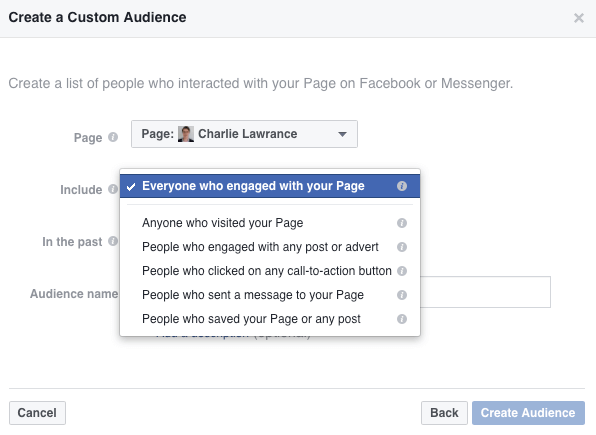October 29, 2021 - Brittany Garlin
Impacts of Facebook’s Privacy on Ad Targeting (+8 Tips to Succeed)
Facebook’s privacy settings are undergoing a massive change right now! While this is excellent for users, it means that marketers will have to be more diligent on targeted marketing strategies to abide by Facebook’s privacy rules. The platform has been highly successful in the past decade and a half and has seen unprecedented growth on all fronts, with more than 2.8 billion active users by the end of 2020 (last year).
For marketers, Facebook and Google Ads were the two most potent retargeting methods to get new consumers. The targeting that Facebook offered digital marketers was precise, effective, and, for many users, quite invasive. However, this strategy led to several brands getting recognition across platforms, with a lot of shares, likes, and comments. Potential customers could quickly see the benefits of the brands and would engage with the marketing material, content, and ads.
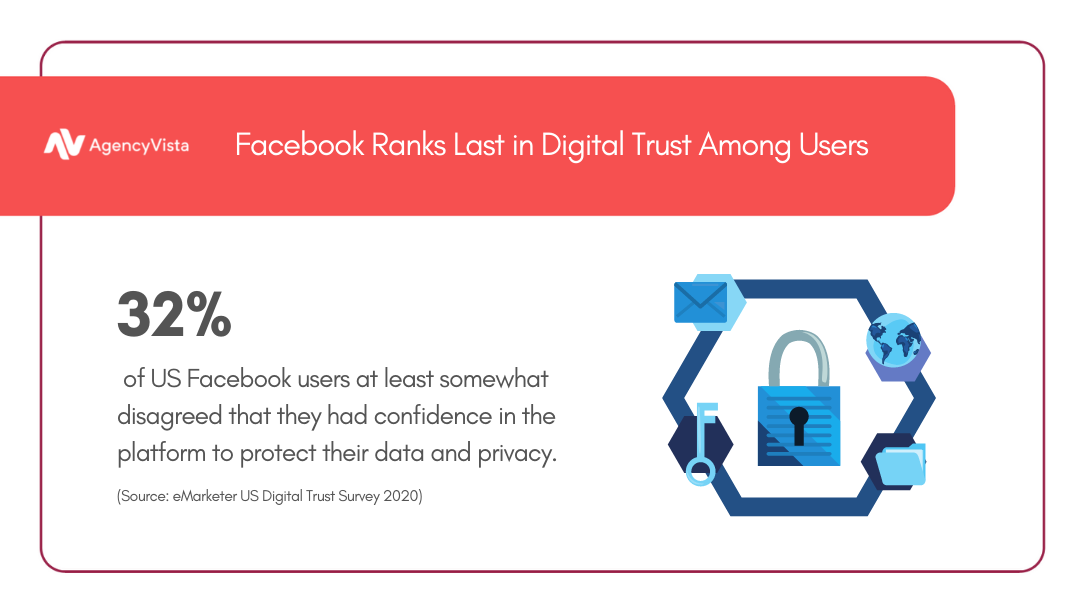
In recent years, Facebook’s privacy settings have had to be reworked to abide by the laws of data sharing of users. Facebook faced a lot of flak due to its data vulnerability. This data breach led to enormous security risks, with the personal information of users like birth dates, names, bios, addresses, and more getting leaked online. However, Facebook tried to defend its stance on privacy, data storage, and usage.
The security breach, data leaks, and risk levels gave rise to stringent privacy measures from mobile providers like Apple, with additional permission requirements from users (to share data), privacy protection, and more.
Third-party data is mainly used in advertising for targeting, ad delivery, optimization, and so on. Marketers are now re-thinking their strategies with these updated changes and considering Facebook alternatives. User data tracking, information, and analysis are severely limited after the Facebook algorithm and search updates.
Facebook tried to oppose the evolution of data tracking by phone providers like Apple since it severely affected the businesses marketing on the social media platform. The change in the privacy setting makes all data tracking within apps opt-in for users. The new change pops up on users’ phone apps with explicit prompts that display the opt-in function. The new privacy laws have caused the targeting feature for marketers to undergo several changes. The Apple iOS 14 opt-out feature for tracking and Google’s elimination of third-party cookies have led to massive retargeting strategies on Facebook.
What Are PETs And How Do They Affect Marketers?
To combat data issues, Facebook introduced a set of Privacy Enhancing Technologies (PET) for advertisements. Calling the PETs the next step of data privacy and ad enhancement, Facebook now minimizes the amount of data processed to help users’ indiscriminate use of personal information.
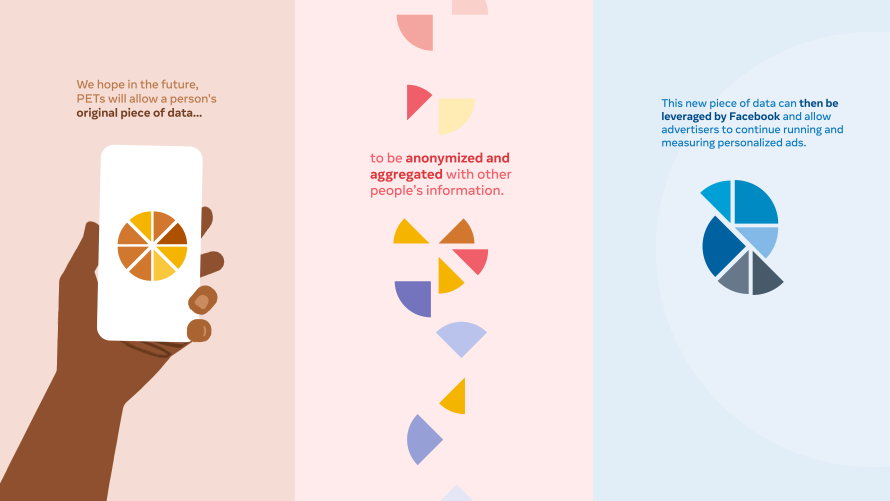
PETs use advanced statistics and cryptography to help preserve critical functionality like personalization and ad measurement.
3 Types of PETs for Marketers on Ad Personalization and Measurement:
Secure Multi-party Computation (MPC):
MPC helps businesses work together by sharing unintelligible and encrypted data. This means that marketers can collaborate with publishers and platforms without compromising users’ private data. With this technology, marketers can still make ads effective and personal. Advertisers/ marketers would need to encrypt data before sending it to third-party publishers or platforms. They would be allowed to decrypt the data only to obtain the personal gains for the ad campaigns.
On-device Learning:
As the name suggests, On-device learning uses an algorithm to follow trends of purchases and views without sending details of items purchased or email addresses to remote servers or the cloud. On-device learning improves over time as the algorithm sends patterns without compromising user details. Marketers can use on-device learning and make use of the algorithm to retarget users who have purchased or viewed items/products that are similar.
Differential Privacy:
Differential Privacy is an excellent method to protect user data from being reused or re-identified. Differential privacy includes ‘noise’ to datasets of users. It adds incorrect figures or numbers to the datasets to skew the actual results. This discourages data-driven perfection in ad targeting. Marketers can use this to ensure that they only target groups of audiences within a pool.
How the Apple iOS 14 Release Has Reworked Facebook’s Privacy Setting on Ad Targeting
Marketers using Facebook for ad targeting and campaigns know that relevant audiences are captured by third-party data, marketer/ advertiser data, and Facebook user data.
Third-party Data
Facebook does not specify precisely what the third-party data on the site entails. There is general information about third-party data available that can be used to help advertisers on Facebook. Since third-party data relies on cookies, the new privacy settings will have a severe impact.
Marketer/ Advertiser Data
Advertiser data can be a healthy mixture of data from primary sources and third parties. Primary sources include data from users that interact directly with the brand via email, app, website, or offline. Marketers can also rely on data from email lists, users id’s, and so on. The new privacy feature will affect third-party tracking with the implementation of the deprecation of cookies. The iOS 14 app tracking opt-out feature also works detrimentally for advertisers wishing to use the data for targeted ads across the web.
Facebook User Data
Facebook user data includes locations, interests, behaviors, connections, and demographics. Since all this is first-party data for Facebook, the iOS 14 privacy opt-out feature does not affect the social media giant.
How Does Facebook Retargeting Work and What Are The Challenges in 2021?
Marketing is more than just gaining new users and audiences. It is also about getting previously captured audience interested again using remarketing or retargeting techniques. Facebook retargeting helps reach audiences who have once connected with the brand or business through ad campaigns in the past. Marketers have successfully used Facebook to reconnect and reengage with target audiences over the past decade. Facebook retargeting helps loyal customers rediscover what they liked about the brand or business.
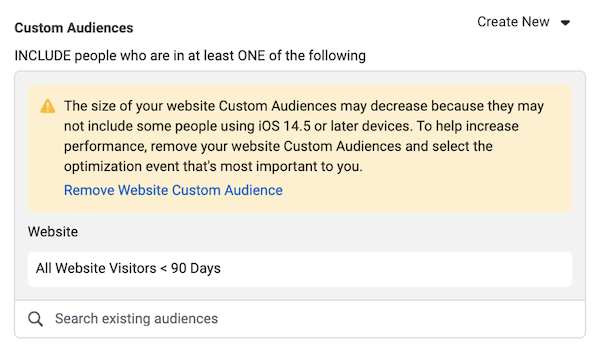
Marketers can retarget Facebook users who have shown previous interest in ad campaigns, brands, and businesses by:
- Primary Data: Customer lists, app activity, offline activity, web-based activity
- Facebook Data: Facebook users who have previously interacted with the ad campaign, brand, or business using videos, instant experiences, business pages, lead forms, and more.
Facebook’s Privacy Challenges on Retargeting
- Sources: The sources that marketers previously used for retargeting have been affected maximum because of the privacy settings.
- Custom Audiences: Custom audiences will decrease with the number of opt-out users who previously engaged with the ad campaigns.
- Exclusion: It is not possible for marketers to exclude previous users because of data loss. Due to privacy constraints, it is not possible to exclude prior users who have previously purchased or used products.
Facebook’s Privacy Updates: Retargeting Tips
Facebook always tries to ensure that marketers and businesses can use the platform successfully. Here are a few tips for marketers to help enhance ads and retarget audiences without compromising Facebook’s privacy rules on user data.
1. Use Audience Expansion With Broad Targeting
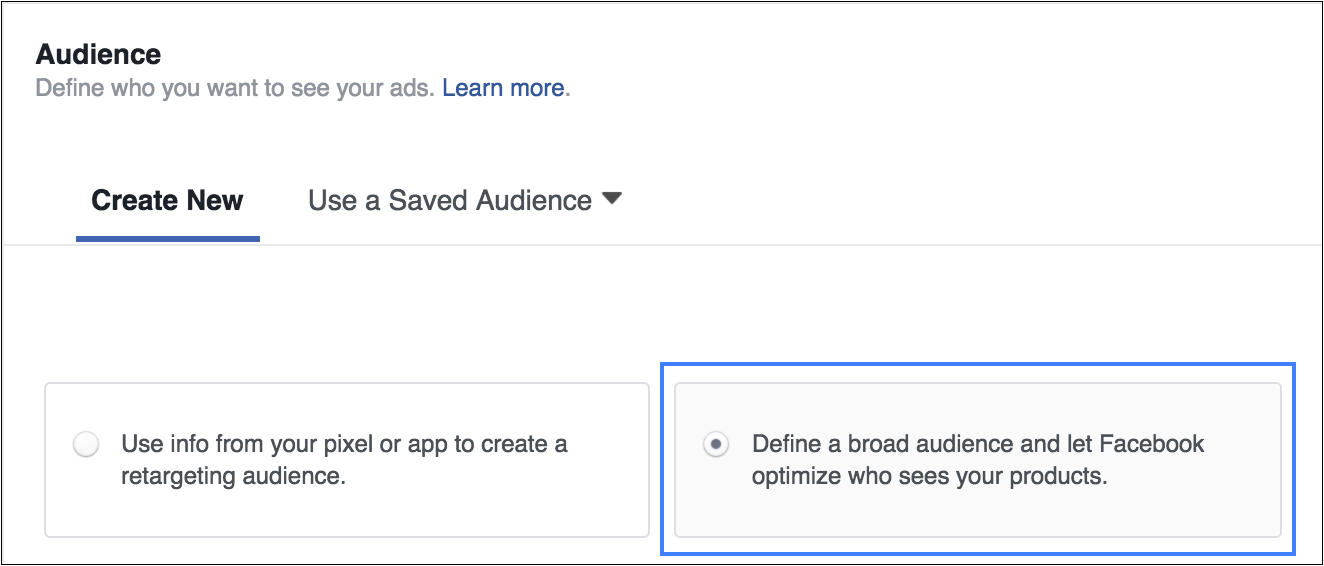
Using broad targeting and expansion targeting; marketers can avail excellent results from the entire Facebook family of apps (Audience Network, Instagram, and Facebook). Targeting expansion allows marketers to reach a larger audience through Facebook’s first-party data. Since marketers need to specify defined criteria for detailing target audiences, audience expansions help Facebook dynamically include users for similar opportunities.
2. Upload Previously-Held Customer Lists
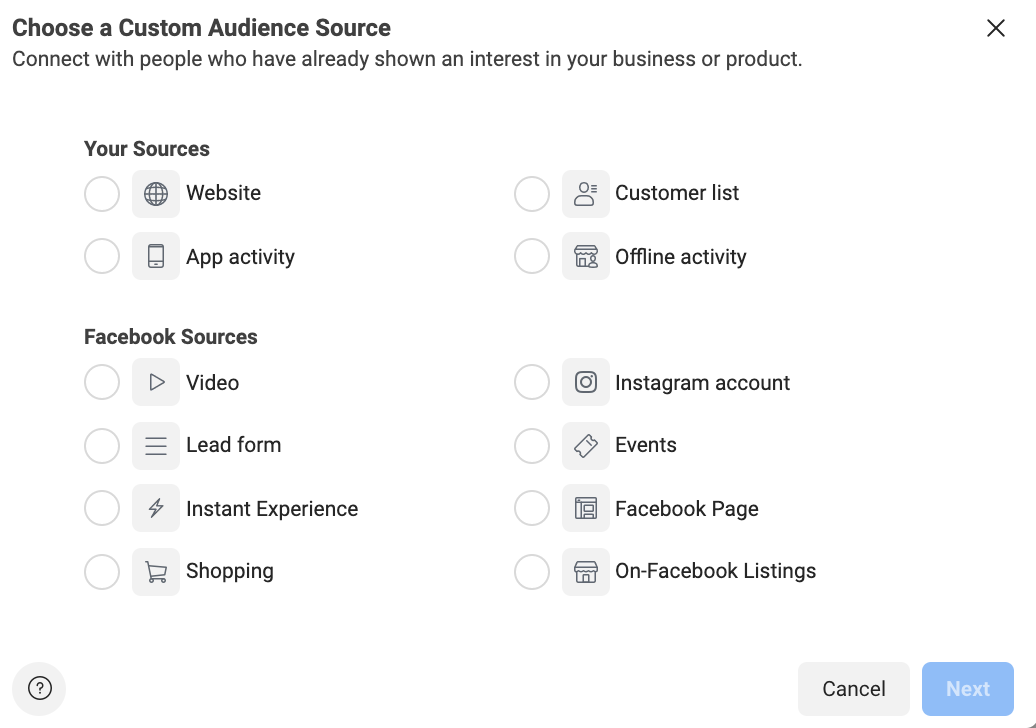
Customer lists are excellent for marketers to reach primary and third-party audiences for ad retargeting on Facebook. Customer lists help mitigate plenty of losses. While they are not perfect, they work many times. They are not 100% foolproof since all the information may not always be correct. Marketers may have access to customer lists with information that does not correlate to their Facebook data. For example, an email address that the marketers have on a user may not be the same address used to sign up on Facebook.
When users are matched to Facebook, they’re added to the customer lists for accurate ad retargeting.
Facebook Privacy Tip: Customer lists are fabulous methods that marketers can use to reduce the backstop due to the cookies on websites. However, it is not a sure-shot method for retargeting all users.
3. Use Facebook Resources
Facebook has excellent resources that marketers can tap into to help with retargeting. It is best to rely on user interactions with the platform instead of cookies. Facebook resources include Instagram accounts, video, instant experiences, the Facebook page, likes, shares, comments, events, shopping, lead forms, and on-Facebook listings.
Marketers should use Facebook-owned data to ensure the information isn’t violating any privacy laws and statutes. Using the interaction to retarget marketing efforts is an excellent method to reengage users with content like ads, videos, images, and more.
- Ad Targeting For Lookalike Audiences: Lookalike audience tapping is a compelling Facebook retargeting feature. Lookalike audiences are untapped audiences with similar characteristics to the target audience. Marketers can use the Custom Audience feature from Facebook and leverage information like behaviors, buying patterns, interests, and demographics to reach larger target groups. Lookalike audiences are excellent considering the new challenges with the iOS 14 privacy update.
The most critical aspect of lookalike audiences is that the source audience needs to be vetted exceptionally well. Not having a targeted source audience to create a lookalike audience may create issues with the lookalike feature and not provide the precision needed.
Facebook Privacy Tip: Marketers need to take care to ensure that all source audience uploads are rechecked for accuracy.
4. Avoid Website Audiences On Facebook
Retargeting efforts are usually unsuccessful if marketers use website audiences (brand/ business audiences) to get new sources. All purchase lists and web visitor lists tend not to be very effective, and the effort to vet each individual source can be extremely time-consuming in the long term.
6. Use Facebook Data Sources
Sticking with Facebook data sources is excellent for avoiding privacy issues related to user data. Marketers should make use of Facebook data sources to maintain the integrity of all relevant data.
- Behaviour And Interest Prospecting: Since Facebook has some of the largest numbers of new and active users online worldwide, marketers should lean on the prospecting capabilities already provided. With time, gaining insight into various audience segments has also developed to become quite advanced.
Behavior and interest prospecting via the Facebook platform includes on-Instagram and on-Facebook users, with third-party sites on the Facebook Audience Network. Marketers can use the interest and behaviors of users on the sites/ pages visited, segment interests, and more.
While this is still an excellent method to target audiences on Facebook, the accuracy of the targeting may be in slight jeopardy because of the new privacy settings. With the loss of third-party tracking pixels, the search criteria and results may become a little generic.
Facebook Privacy Tip: Marketers should include several nuances of the keywords with related topics for better behavior and interest prospecting results.
7. Do The Tracking Independently
With the new privacy setting impacting Facebook site-wide, marketers/ advertisers should opt for third-party tracking individually. Unfortunately, this is the only viable method to protect the brand against valuable data loss. The tracking option is a highly minute change, but it is the only real action advertisers can take.
8. Test Out Other Targeting Options
Since digital marketers need to drive substantial ad campaigns and brand strategies, it is best to use all possible targeting options available on Facebook. Maximum relevant visibility and engagement are possible with the help of demographic audience prospecting.
Facebook demographic prospect targeting relies on the information that users of the platform supply to the social media giant. This information and data is provided to Facebook directly by the users and is considered a primary data source for Facebook. Marketers using the Facebook platform can use the demographics already available with Facebook for accurate ad targeting.
Facebook has two types of targeting options:
- Age And Gender-Based Demographic Targeting: Facebook also has limitations to targeting ads meant explicitly for minors and has an ‘all’ feature in the gender selection for equality and inclusivity.
- Detailed Demographic Targeting: Detailed targeting has other demographics that users have provided like marital status, education, life events, location, financial situation, parents, relationship status, dependents, political interests, work, and more.
Facebook Privacy Tip: Marketers can narrow down the ad targeting specifics to gain greater accuracy by using the demographics. It is best to explore options already existing on Facebook to gain additional users and reengage old users.
9. Target Personal Demographics
Marketers prefer using Facebook for ad targeting since most people have informal communications, share life events, personal stories, and more on Facebook. Users usually do not do any of these things on professional networking sites. With users being more open to information about their private lives on Facebook, ad targeting can work better when the event is tied to someone’s personal life event.
Marketers should capitalize on this feature when targeting relationship status, income brackets, work, education, and more. Marketers can also increase the accuracy and relevancy of ads by catering to the interests of users on Facebook. It is widely known that people prefer reading, viewing, and sharing content of personal interest. For example, if 1000 users like rock music, the ad can be targeted towards a new online sale of music.
Quick Recap of Facebook Privacy’s Impact on Ad Targeting
Lookalikes and Retargeting
- Problem: Loss of cookies limit the accuracy of web traffic audiences. App tracking opt-out feature
- Solution: Customer lists, rely on Facebook sources, and avoid web traffic-based audiences
Behaviors and Interests
- Problem: Interest and behavioral targeting will be affected by the loss of third-party cookies
- Solution: Use other targeting options. Marketers should use tracking independently, demographic prospecting.
Demographics
- Problem: Low impact on demographics
- Solution: Use Facebook demographics for age, gender, and interests.
With the ever-changing privacy landscape, Facebook’s privacy policies will continually need to be updated to current regulations. Data privacy issues and conditions imposed by relevant security concerns will force the marketers to continually evolve and change with each update.
Since the existing options available on Facebook can change without notice, marketers need to rely on all viable options to ensure the Facebook ad targeting is successful. Marketers will also have to test newer options for increased efficiency in targeting. Monitoring and responding to the changes is the best way forward since the privacy settings may impact marketing strategies in the future too. Digital marketers need to assess, follow, and try newer targeting techniques to ensure privacy and data protection.
If you’re a marketing agency, scale your social media efforts with Agency Vista’s plans — get started today, for free!
If you’re a business looking to improve your Facebook marketing strategy, check out the Top Facebook Marketing Agencies of 2021.
Grow with the #1 marketing agency network and top destination for businesses to hire
Sign up for Agency Vista, and see why over 50,593 marketing agencies trust us to grow their online presence and foster credible relationships with businesses. We’re free forever, and you can upgrade, downgrade, or cancel any time.
Get Started
Get started free
Setup in minutes
No credit card required

Agency Vista is the new way for brands to find and easily connect with marketing agencies. Explore 50,593 verified profiles and reviews to find the right agency for your business.
Copyright © 2025 Agency Vista LLC. All rights reserved. Lovingly made in NYC.

